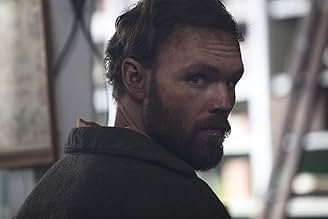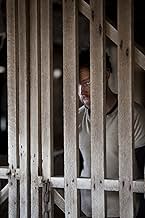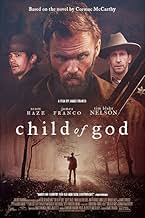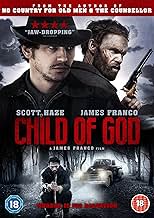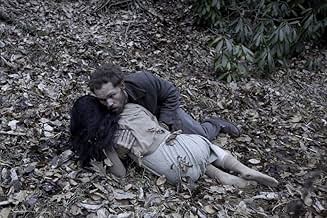CALIFICACIÓN DE IMDb
5.4/10
4.5 k
TU CALIFICACIÓN
Es la historia de Ballard. Un joven, violento y desposeído, cuya vida es un intento desastroso por existir fuera del orden social.Desprovisto una y otra vez de lazos afectivos, desciende lit... Leer todoEs la historia de Ballard. Un joven, violento y desposeído, cuya vida es un intento desastroso por existir fuera del orden social.Desprovisto una y otra vez de lazos afectivos, desciende literal y metafóricamente al nivel de un cavernario.Es la historia de Ballard. Un joven, violento y desposeído, cuya vida es un intento desastroso por existir fuera del orden social.Desprovisto una y otra vez de lazos afectivos, desciende literal y metafóricamente al nivel de un cavernario.
- Dirección
- Guionistas
- Elenco
- Premios
- 2 premios ganados y 1 nominación en total
Ciera Danielle
- Salesgirl
- (as Cierra Parrack)
- Dirección
- Guionistas
- Todo el elenco y el equipo
- Producción, taquilla y más en IMDbPro
Opiniones destacadas
For those who've not yet partaken in the depraved and deranged dealings of Cormac McCarthy's 1973 book Child of God you are in for one almighty shock if you by chance stumble upon this new James Franco directed effort, a tale that is utterly original in all its triumphs and shortcomings and a tale that deals with some seriously tricky business that on page seemed almost too much to ever commit to screen but thanks to an obvious commitment to the text by Franco the film works to a level that marks the event as an oddity not unworthy of seeking out.
Franco who has long held affiliation with a desire to transform McCarthy's more insane and often controversial works to screen here goes for much of the same aesthetic he created in his last directional outing As I Lay Dying, a low budget yet gritty feel that uses it's natural surrounds to good effect and gives off the illusion of a bigger project. Franco harbors a good feel for not only Lester Ballard the creation but also his world, the feel of the lonely mountains and the people that inhabit them is captured to great effect and visions so vividly written in the book are bought to life here in many respects. With the world captured so foreign too many of us, Franco in the form of actor Scott Haze has found someone that against all odds is Lester Ballard and leads the story of insanity forward.
Without spoiling the character for those uninitiated, Lester Ballard is a thoroughly despicable and complex creation, a man who despite clearly not being of sane mind is also a man who knows better than the acts he commits. Haze owns this "child of god" from small mannerisms through to out and out rage, from random lonely road discoveries to questionable hair and makeup, Haze gets Lester right. Haze is the focus point of the picture with only small appearances by Tim Blake Nelson and Franco himself it's clear that this film is built by Haze but there is only so far his performance can carry a picture that in the end is dealing with material mighty hard to not only relate to but to tolerate and it's a commendable feat to the filmmakers that you won't be reaching for the off switch a mere 30 minutes in for make no doubt about it there are mightily tough and mature themes the film deals with.
Child of God is a film you feel will slowly be discovered by an unknowing audience who will react strongly either way in favour or hatred to a tale that provides no reason for things being the way they are. For those who are familiar with the text this is a very strong attempt at turning an almost un-filmable book into a quality film and as it stands is another fine turn by Franco as a director in what is shaping up to be an interesting career behind the camera.
3 conniving stuffed toys out of 5
Franco who has long held affiliation with a desire to transform McCarthy's more insane and often controversial works to screen here goes for much of the same aesthetic he created in his last directional outing As I Lay Dying, a low budget yet gritty feel that uses it's natural surrounds to good effect and gives off the illusion of a bigger project. Franco harbors a good feel for not only Lester Ballard the creation but also his world, the feel of the lonely mountains and the people that inhabit them is captured to great effect and visions so vividly written in the book are bought to life here in many respects. With the world captured so foreign too many of us, Franco in the form of actor Scott Haze has found someone that against all odds is Lester Ballard and leads the story of insanity forward.
Without spoiling the character for those uninitiated, Lester Ballard is a thoroughly despicable and complex creation, a man who despite clearly not being of sane mind is also a man who knows better than the acts he commits. Haze owns this "child of god" from small mannerisms through to out and out rage, from random lonely road discoveries to questionable hair and makeup, Haze gets Lester right. Haze is the focus point of the picture with only small appearances by Tim Blake Nelson and Franco himself it's clear that this film is built by Haze but there is only so far his performance can carry a picture that in the end is dealing with material mighty hard to not only relate to but to tolerate and it's a commendable feat to the filmmakers that you won't be reaching for the off switch a mere 30 minutes in for make no doubt about it there are mightily tough and mature themes the film deals with.
Child of God is a film you feel will slowly be discovered by an unknowing audience who will react strongly either way in favour or hatred to a tale that provides no reason for things being the way they are. For those who are familiar with the text this is a very strong attempt at turning an almost un-filmable book into a quality film and as it stands is another fine turn by Franco as a director in what is shaping up to be an interesting career behind the camera.
3 conniving stuffed toys out of 5
When word broke out that James Franco, wannabe wunderkind who has taken to adapting classic American literature to the big screen to, well, mixed results, would be adapting my favorite author's work, I prickled with righteous indignation. I don't care much for Franco and indeed find him to be a jack of all trades but indeed master of none: he is a subpar actor, his writing leaves a LOT to be desired, and his direction feels a little too over-reliant on flashy tics that add an unnecessary layer of pretension to the proceedings. And here he is, adapting the work of the master: Cormac McCarthy.
At first, Franco announced he would be tackling McCarthy's masterpiece, the ultraviolent scalp- hunter saga "Blood Meridian", but after a while, he decided to cut his teeth on a smaller -- but by no means lesser -- work of ol' Cormac's. And this is how he came to deliver "Child of God" onto the masses.
Despite its brevity, "Child of God" is by no means an accessible novel: it's lean, mean and has a soul blacker than night. The novel is just like its protagonist, Lester Ballard, a loner who skulks about the Tennessee backwoods like a dog suffering the early onset of rabies, indulging in varying degrees of vicious activities, from assault to necrophilia to, eventually, murder. Ballard is not your typical protagonist, and yet the way Cormac McCarthy approached him, he was made both revolting and at the same time strangely empathetic, as he managed to submerge the reader into Ballard's festering brain. "A child of God much like yourself" is how McCarthy's opening lines describe Ballard, signifying that the madness and malice that ferments within the man is a seed to be found in any of us. And despite its grim premise, "Child of God" is astoundingly, gut-bustingly funny, like the worst sort of dead-baby joke.
Unfortunately, I feel that Franco has missed the levity, instead emphasizing the straight serial- killer premise. This isn't to say that Franco doesn't hew close to the novel; if anything, he is a little too faithful, even relying on having blocks of text from the novel playing out on the screen. It's an admirable slice of avant-garde, even if I feel that Franco is forgetting the first rule of filmmaking: show, don't tell. Even though McCarthy's prose is magic, Franco should've known (as the Coen Brothers and John Hillcoat knew before him) that McCarthy's words can be translated visually to bring the same harrowing, to-the-bone effect.
That said, Franco does show a great deal of passion for the material. But even beyond the use of McCarthy's words, the most crucial aspect of an adaptation of "Child of God" is the man who will be playing Lester Ballard. And in this film, Ballard is played not by Franco, but by his buddy and frequent collaborator Scott Haze. Whether or not you approve of Haze's performance, you can't say he doesn't go for broke in his portrayal of Ballard. Haze's Ballard is beyond laconic; he speaks in strangled, guttural inarticulations that sound almost caveman-like. I do think that there are times that he lays it on a bit too thick, and I think his drooling, leering presence lacks any of the bizarre charm that made Ballard such a fascinatingly funny character in the book. Haze plays Ballard like a "Deliverance" refugee, and while it isn't bad work on its own, I do feel that Haze is a bit too superficial in his take on one of McCarthy's greatest creations. He makes up for it in intensity, though, gotta give him that.
It also doesn't help that Franco's film has a cheap aesthetic to it, lacking any of the grim Gothic atmosphere of the book. It's my biggest issue with Franco as a director: he has no real concept of effective mise-en-scene, instead opting to point the camera and let things play, cutting an odd times that feel far too arrhythmic to be deliberate. Much like last year's interesting-but- too-shallow "As I Lay Dying", Franco gets the story right but tells it in the most simple, A-to-B- to-C way possible. It's worth the watch for Haze's performance (and also for Tim Blake Nelson, who feels like he should've featured in any and every Cormac McCarthy film before this), but it only serves to prove that we're lucky that we dodged a "Blood Meridian" adaptation by James Franco.
At first, Franco announced he would be tackling McCarthy's masterpiece, the ultraviolent scalp- hunter saga "Blood Meridian", but after a while, he decided to cut his teeth on a smaller -- but by no means lesser -- work of ol' Cormac's. And this is how he came to deliver "Child of God" onto the masses.
Despite its brevity, "Child of God" is by no means an accessible novel: it's lean, mean and has a soul blacker than night. The novel is just like its protagonist, Lester Ballard, a loner who skulks about the Tennessee backwoods like a dog suffering the early onset of rabies, indulging in varying degrees of vicious activities, from assault to necrophilia to, eventually, murder. Ballard is not your typical protagonist, and yet the way Cormac McCarthy approached him, he was made both revolting and at the same time strangely empathetic, as he managed to submerge the reader into Ballard's festering brain. "A child of God much like yourself" is how McCarthy's opening lines describe Ballard, signifying that the madness and malice that ferments within the man is a seed to be found in any of us. And despite its grim premise, "Child of God" is astoundingly, gut-bustingly funny, like the worst sort of dead-baby joke.
Unfortunately, I feel that Franco has missed the levity, instead emphasizing the straight serial- killer premise. This isn't to say that Franco doesn't hew close to the novel; if anything, he is a little too faithful, even relying on having blocks of text from the novel playing out on the screen. It's an admirable slice of avant-garde, even if I feel that Franco is forgetting the first rule of filmmaking: show, don't tell. Even though McCarthy's prose is magic, Franco should've known (as the Coen Brothers and John Hillcoat knew before him) that McCarthy's words can be translated visually to bring the same harrowing, to-the-bone effect.
That said, Franco does show a great deal of passion for the material. But even beyond the use of McCarthy's words, the most crucial aspect of an adaptation of "Child of God" is the man who will be playing Lester Ballard. And in this film, Ballard is played not by Franco, but by his buddy and frequent collaborator Scott Haze. Whether or not you approve of Haze's performance, you can't say he doesn't go for broke in his portrayal of Ballard. Haze's Ballard is beyond laconic; he speaks in strangled, guttural inarticulations that sound almost caveman-like. I do think that there are times that he lays it on a bit too thick, and I think his drooling, leering presence lacks any of the bizarre charm that made Ballard such a fascinatingly funny character in the book. Haze plays Ballard like a "Deliverance" refugee, and while it isn't bad work on its own, I do feel that Haze is a bit too superficial in his take on one of McCarthy's greatest creations. He makes up for it in intensity, though, gotta give him that.
It also doesn't help that Franco's film has a cheap aesthetic to it, lacking any of the grim Gothic atmosphere of the book. It's my biggest issue with Franco as a director: he has no real concept of effective mise-en-scene, instead opting to point the camera and let things play, cutting an odd times that feel far too arrhythmic to be deliberate. Much like last year's interesting-but- too-shallow "As I Lay Dying", Franco gets the story right but tells it in the most simple, A-to-B- to-C way possible. It's worth the watch for Haze's performance (and also for Tim Blake Nelson, who feels like he should've featured in any and every Cormac McCarthy film before this), but it only serves to prove that we're lucky that we dodged a "Blood Meridian" adaptation by James Franco.
well done, Mr. Franco. after watched this film, i have to say that you are indeed got something we called 'talent'. this film has put you in a totally different category and level. the original story created by the author of 'no country for old man' was such a weird one but in other word, a very very disturbing and sad one. we got a crazy, stone-cold bloody killer in 'no country for old man', now we got a half crazy, half idiotic lone-wolf-like loco hilly-billy roaming aimlessly day and night. we saw him gradually deteriorated, became crazier, became a more and more violent sociopath. he at first was not a rapist but was imprisoned as a rapist, that jail time had changed him into another unsalvageable rapist and a serial killer, an incurable social disease. Scott haze had successfully performed an Oscar level character, very convincing, very intense, very pitiful dejected person who step by step turned into a half human, half animal like tragic role. what made this novel and the adapted film unique is although the 'lester' guy did a lot of unthinkable crimes, we, the viewers, seemed not be able to hate him as we usually hate a vicious killer, murderer or a rapist. this character has gently affected us to sympathize him as a victimized victim. after watched this film, i have found that i could not judge or blame him as a bad person by all means, even he had caused lot of troubles and deaths, i seemed to still consider him as another kind of victim.
this is a great viewing experience.
this is a great viewing experience.
I sat still after the United States premiere of James Franco's "Child of God" at the New York Film Festival, not as much contemplating whether or not it was good as I was considering whether or not I liked it. Mostly true to the Cormac McCarthy novel on which it was based, the film follows the cloistered and violent existence of Lester Ballard (Scott Haze) who lives isolated in the woods of Tennessee committing crimes of the most grotesque caliber. I won't say much more about the plot other than the fact that the sadistic actions shown on screen evoke an uneasy humor, a disturbing essence of comical brutality. To say the least, this movie is not for the queasy or the fainthearted. You will squirm.
Organization:
James Franco decided to organize the film into three acts, clearly distinguished from one another by title cards. While the producer argued this was done to manifest the passage of time, I felt it had no such effect. To add to this distortion of time and space, scenes are executed as vignettes. There's a constant transition fading in and out of the action, not only prompting confusion as to how much time passes between each scene, but also distracting the audience from the plot by means of excessive filmmaking. Some scenes exist solely for the purpose of character development while others seem to have no function at all. The relevant vignettes are strung together by a consistently distressed brain. While this structure may detract from the linear storyline, it instead leaves more up to interpretation and imagination. No number of scenes can embody the true insanity of Lester Ballard, we can only imagine what madness must be going on between the fades.
Performances:
Scott Haze's performance as Lester Ballard is probably the most memorable and noteworthy aspect of the film. Haze, who lived alone in caves and lost 45 pounds to prepare for this dynamic and challenging role, brilliantly expresses the complex lunacy of Ballard. He adjusted his voice to a barely comprehensible Tennessee accent and habitually licks his lips and bares his teeth, similar to Heath Ledger's Joker. Admitting that he channeled troubles from his own past when confronting the character, Haze often appears ignorant and childlike, constantly screaming and salivating, a repulsive portrait of a man bore from nature's womb. While sometimes funny, his interactions with his victims are unsettling yet strangely amorous. Just like in the writing of Cormac McCarthy, the audience lacks any sympathy for Ballard, for it's nearly impossible to relate to him. Franco isn't looking for your sympathy, he wants nothing more than your intrigue and attention. To witness Haze is to observe an animal, wild, vicious, and savage. The only other notable performance is that of Tim Blake Nelson playing Sheriff Fate. He conducted the role with a mediated honesty, constructing as realistic a character as possible and standing out within the frame, even with minimal screen time.
Technicalities:
All things considered, the technical aspects of the film are quite impressive. Funded out of James Franco's own pocket, the movie looks and sounds great considering its modest budget. The cinematography of the rural Tennessee landscape is eerily beautiful, shot hand-held on a handful of Canon 5Ds. The desaturated and gritty colors add an appropriate rustic feel to the film, further enhancing the forest terrain. The original music, although not particularly memorable, suits the setting well. Furthermore, the nameless narration was true to McCarthy's technique and certainly added to the tone of the film, keeping the audience attentive all the same. Overall, the movie's unsensational filmmaking is entirely fitting, ensuring the horrors on screen are ever more explicit, ever more real.
Conclusion:
You can tame the land, but you can't tame a man. "Child of God" is a commentary about the dispossessed in an incestuous homeland. Littered with existential imagery and dialogue, the film offers a respectful and honest rendering of the novel. While I may not agree with some storytelling elements and approaches, Franco still manages to get the point across and deliver a message, a testament to rejection, violence, and humanity. The film is definitely worth a watch if you can stomach it and works as a cogent visual supplement to the novel. I look forward to seeing more James Franco adaptations in the future.
Organization:
James Franco decided to organize the film into three acts, clearly distinguished from one another by title cards. While the producer argued this was done to manifest the passage of time, I felt it had no such effect. To add to this distortion of time and space, scenes are executed as vignettes. There's a constant transition fading in and out of the action, not only prompting confusion as to how much time passes between each scene, but also distracting the audience from the plot by means of excessive filmmaking. Some scenes exist solely for the purpose of character development while others seem to have no function at all. The relevant vignettes are strung together by a consistently distressed brain. While this structure may detract from the linear storyline, it instead leaves more up to interpretation and imagination. No number of scenes can embody the true insanity of Lester Ballard, we can only imagine what madness must be going on between the fades.
Performances:
Scott Haze's performance as Lester Ballard is probably the most memorable and noteworthy aspect of the film. Haze, who lived alone in caves and lost 45 pounds to prepare for this dynamic and challenging role, brilliantly expresses the complex lunacy of Ballard. He adjusted his voice to a barely comprehensible Tennessee accent and habitually licks his lips and bares his teeth, similar to Heath Ledger's Joker. Admitting that he channeled troubles from his own past when confronting the character, Haze often appears ignorant and childlike, constantly screaming and salivating, a repulsive portrait of a man bore from nature's womb. While sometimes funny, his interactions with his victims are unsettling yet strangely amorous. Just like in the writing of Cormac McCarthy, the audience lacks any sympathy for Ballard, for it's nearly impossible to relate to him. Franco isn't looking for your sympathy, he wants nothing more than your intrigue and attention. To witness Haze is to observe an animal, wild, vicious, and savage. The only other notable performance is that of Tim Blake Nelson playing Sheriff Fate. He conducted the role with a mediated honesty, constructing as realistic a character as possible and standing out within the frame, even with minimal screen time.
Technicalities:
All things considered, the technical aspects of the film are quite impressive. Funded out of James Franco's own pocket, the movie looks and sounds great considering its modest budget. The cinematography of the rural Tennessee landscape is eerily beautiful, shot hand-held on a handful of Canon 5Ds. The desaturated and gritty colors add an appropriate rustic feel to the film, further enhancing the forest terrain. The original music, although not particularly memorable, suits the setting well. Furthermore, the nameless narration was true to McCarthy's technique and certainly added to the tone of the film, keeping the audience attentive all the same. Overall, the movie's unsensational filmmaking is entirely fitting, ensuring the horrors on screen are ever more explicit, ever more real.
Conclusion:
You can tame the land, but you can't tame a man. "Child of God" is a commentary about the dispossessed in an incestuous homeland. Littered with existential imagery and dialogue, the film offers a respectful and honest rendering of the novel. While I may not agree with some storytelling elements and approaches, Franco still manages to get the point across and deliver a message, a testament to rejection, violence, and humanity. The film is definitely worth a watch if you can stomach it and works as a cogent visual supplement to the novel. I look forward to seeing more James Franco adaptations in the future.
I had no idea what to expect with Child of God. I haven't read the book but I have heard its quite disturbing. I had my skepticism because it could have easily been a disturbing movie just for the sake of being disturbing, but I had hope that James Franco would deliver something memorable, and he has!
Lester Ballard is a despicable man. Shouting and abusing anyone in his sights. Filthy, foul mouthed, psychotic, this is a man you wouldn't want to have a conversation with, and I was expecting just to have nothing but repulsive feelings when watching him on screen! But what makes the film work, is that Franco, although not condoning this man's behaviour, allows some humanity inside a person that everyone deemed as a lost cause. There was a strange beauty in this film that hid under all the ugliness.
The acting from Scott Haze is nothing short of amazing. Psychotic one second, to a crying mess the next. You have a whirlwind of emotions when dealing with this very dramatic character.
Be warned, the themes in this film are very extreme and will upset a lot of people, but I thought it had a purpose.
If you don't mind watching films that aren't afraid to show you the ugly side of life together with a strange sense of beauty, then Child of God comes recommended!
Lester Ballard is a despicable man. Shouting and abusing anyone in his sights. Filthy, foul mouthed, psychotic, this is a man you wouldn't want to have a conversation with, and I was expecting just to have nothing but repulsive feelings when watching him on screen! But what makes the film work, is that Franco, although not condoning this man's behaviour, allows some humanity inside a person that everyone deemed as a lost cause. There was a strange beauty in this film that hid under all the ugliness.
The acting from Scott Haze is nothing short of amazing. Psychotic one second, to a crying mess the next. You have a whirlwind of emotions when dealing with this very dramatic character.
Be warned, the themes in this film are very extreme and will upset a lot of people, but I thought it had a purpose.
If you don't mind watching films that aren't afraid to show you the ugly side of life together with a strange sense of beauty, then Child of God comes recommended!
¿Sabías que…?
- TriviaScott Haze moved to Sevierville, TN, to prepare for the role of Lester Ballard. He lived in an isolated cabin in the woods, lost 50 pounds and was reportedly sleeping in caves some nights.
- ErroresLester seems to have an endless supply of bullets.
- Citas
[repeated line]
Lester Ballard: Get off my fuckin property!
- ConexionesFeatured in Filmselskabet: Episode #4.1 (2013)
Selecciones populares
Inicia sesión para calificar y agrega a la lista de videos para obtener recomendaciones personalizadas
- How long is Child of God?Con tecnología de Alexa
Detalles
- Fecha de lanzamiento
- País de origen
- Sitios oficiales
- Idioma
- También se conoce como
- Tanrının Oğlu
- Locaciones de filmación
- Productoras
- Ver más créditos de la compañía en IMDbPro
Taquilla
- Total en EE. UU. y Canadá
- USD 39,324
- Fin de semana de estreno en EE. UU. y Canadá
- USD 27,630
- 3 ago 2014
- Total a nivel mundial
- USD 39,324
- Tiempo de ejecución1 hora 44 minutos
- Color
- Mezcla de sonido
- Relación de aspecto
- 1.85 : 1
Contribuir a esta página
Sugiere una edición o agrega el contenido que falta

Principales brechas de datos
By what name was Child of God (2013) officially released in India in English?
Responda



